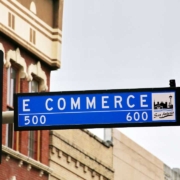Supply chain as a strategy
Supply chain alliances is another look at stabilising your supply chain. A pandemic, war and faltering supply chains, requires a new look at your supply chain.
In the United States, this is known as friendshoring. Instead of offshoring based on cost or reshoring based on locations, it is about stability and sameness of partners. In doing so, it is about corporate social responsibility on a global scale. With upcoming legislation, including at the European level, this will become of great importance in the coming years. The focus will shift to issues such as human rights, stability, climate and working conditions. Where possible, countries that do not comply will be excluded.
Operational
Operationally, it means that your operating area will become a lot smaller. For supply chains, a revolution after 40 years of far-reaching cost cutting and just-in-time thinking. Advocates of friendly alliance point to the enormous environmental burden of today’s supply chains. Not only the production of products is often done in a polluting way under poor conditions. Transport over thousands of kilometres by sea freight is highly polluting. Not just CO2 emissions but also methane and nitrogen oxide. All these substances contribute to global warming. To illustrate : In 2021, 1.3 billion tonnes on 20,694 ships (18,830 in 2020)passed through the Suez Canal. The important corridor between Asia and Europe. So the formation of smaller, reliable homogeneous economic blocs, will be able to make a significant contribution in countering global warming.
The reality
Shortening and making supply chains sustainable will not be an easy task. Not only because of the complexity but also because of existing dependencies. For instance, 64% of global cobalt procurement comes from the Democratic Republic of Congo, much of which is owned by powerful Chinese companies. According to the European Commission, by 2020 China itself will be the world’s leading producer of 61% of silicon metal, 67% of germanium, 84% of tungsten and 87% of magnesium and antimony.
So even if You were to become independent from a country like China, that does not stand the test of CSR criticism. For now, that is not operationally possible. Bij de huidige samenstelling van producten en de grondstoffen die eraan ten grondslag liggen, zal zelfs het reshoren van bepaalde productie, weinig zoden aan de dijk zetten.
Reengineering
A solution can be found to critically examine the composition of your products. Several universities are busy looking for acceptable, sustainable raw materials. The recycling of materials can also make an important contribution to making your chain more humane and climate-friendly. But it will certainly take time. Organizations that are already getting started with this will immediately have a head start.
Politics
Such a major paradigm shift is really only possible if politicians, especially Europe and the US, create frameworks and introduce legislation that ‘force’ a more CSR-oriented way of working. [level playing field] This forces international trade to undergo a thorough reviewing their way of working. As mentioned, such legislation is imminent from Europe.
But don’t let that be the only argument. The changes in our climate are happening at a frantic pace. And not for the better. And for now, everyone is waiting for everyone, with disastrous consequences, no doubt. If we stay on the current path, there will soon be no economy or trade left. That is not a worse case scenario but an established fact.









